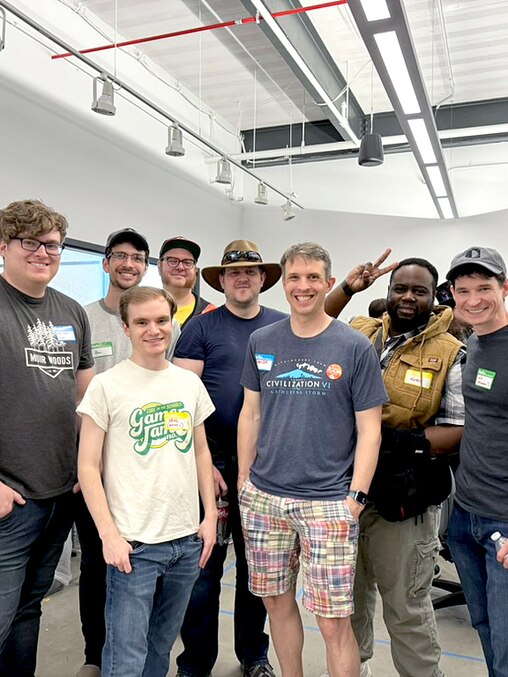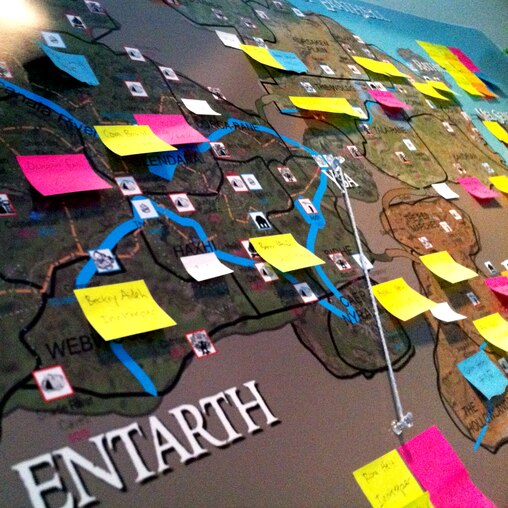In the 1990s, a trio of interns shared a cubicle in Hunt Valley at a strategy gaming company called MicroProse, learning to design and build video games.
Now those interns are leading their own ventures: Greg Foertsch founded Bit Reactor, Tim Kipp co-founded Oxide Games and David Inscore co-founded Big Huge Games. They and other local developers have created or worked on notable games such as “Rise of Nations,” “FrontierVille” and the sci-fi favorite “XCOM” series.
“The three of us are still active in the Baltimore scene, which is kind of weird for that little intern group,” Foertsch said.
Silicon Valley may be the country’s tech hub, and Montgomery County has Maryland’s best-known gaming companies, Bethesda Game Studios and Bethesda Softworks. But Baltimore County is a sleeper success story.
For many in the area — including Foertsch, Kipp and Inscore — working under Sid Meier at MicroProse was a spark. Meier is the developer behind the popular “Civilization” series, which is set to release its seventh edition in February.
Meier co-founded MicroProse in the 1980s and later Firaxis Games, also based in Hunt Valley. He’s a self-proclaimed “godfather of computer gaming” and “benevolent industry patriarch,” according to his 2020 memoir.

But even with the ability to build on a legacy, newer founders have more levels to clear and achievements to unlock before they get anywhere close to the success of their predecessors. Games aren’t treated “quite as seriously in the area,” Kipp said.
Local gaming company leaders say they’d love to see more business incubators, similar to what the broader technology industry offers, and investment from the state through tax incentives and other programs.
“My hope is that not only are we successful but we can build a successful community around entertainment and games,” Kipp said. “The more studios we have in Maryland, the better off we are.”
Level One: MicroProse
When Meier founded MicroProse with Bill Stealey and Andy Hollis, arcades hummed with kids, quarters jangling in their hands and pockets while they waited for a turn to play “Donkey Kong” or “Pac-Man.”
MicroProse created games that spoke to that era, releasing the flight simulator “Hellcat Ace” in 1982. It was developed and copied onto floppy disks using $1,500 in savings. It sold only 50 copies.
But the company stayed the course, striking gold in the mid-1980s with “F-15 Strike Eagle,” which sold more than 1 million copies by the end of the decade.
MicroProse was “one of the big granddaddy companies in the industry, back before everyone learned that California was the cool place to be,” said Tim Train, co-founder of Big Huge Games and a former employee of Meier’s companies. “These independent centers sprung up in the early to mid-’80s, kind of organically, and one just happened to be in Hunt Valley.”
“Sid Meier’s Civilization” has been called one of the most influential computer games in history, setting the stage for the empire-building genre. A computer programmer by training, Meier has said it wasn’t his idea to slap his name on the cover of MicroProse’s most popular titles. Meier declined interview requests.
Online gaming publication IGN ranked the “XCOM” series that MicroProse co-developed the top PC game of all time in 2000 and 2007.
But even with critical acclaim the company struggled financially and then merged with another unsteady company, based in California.
“Some people got restless with the new ownership in California, and a couple of people started to break off,” Greg Foertsch said. “Before then, nobody would ever leave.”
Until Meier himself left.

Level Two: Firaxis
In May 1996, after 14 years of building up MicroProse, Meier launched another video game development company, Firaxis. He took two high-profile employees with him, including its lead video game designer, Brian Reynolds.
Stealey, who co-founded MicroProse with Meier, told the Baltimore Business Journal at the time that his former employees left on good terms. But Stealey also expressed skepticism about their venture. Meier, he said, was “anything but an entrepreneur.”
“He just wants to design games without the pressure of somebody looking over his shoulder,” Stealey said.
Firaxis quickly scored a partnership deal with Electronic Arts, one of the largest video game developers and publishers based in California’s Silicon Valley, providing the financing for its first two games.


The partnership that started Firaxis lasted around four years, but the company moved forward with Meier at the helm creatively.
The studio gained control of the “Civilization” franchise from MicroProse in 2005 and released several new editions, including “Civilization V” in 2010. The title’s release was such a big deal that then-Gov. Martin O’Malley signed a state proclamation making Sept. 21 Sid Meier’s Civilization V Day.
“It became seminal, and not just in PC gaming and strategy gaming but in the industry,” said Dan Baker, a former employee of Firaxis who went on to co-create Oxide Games. “It became a benchmark title, like a famous movie everybody references, more than any other game Firaxis has ever made.”

Level Three: Big Huge Games
Just as MicroProse gave rise to Firaxis, Firaxis gave rise to other gaming companies.
Reynolds and designer Tim Train started Big Huge Games in 2000, staying in Baltimore County. A third co-founder, David Inscore, was part of that power cubicle of interns in the MicroProse days.
Big Huge Games differentiated itself from Firaxis by making multiplayer games.


“Even though I was pretty happy at Firaxis, I was delighted to take that opportunity and go build new kinds of games with Brian,” Train said.
To that point video games had had a slow buildup, but in the 2000s improvements tookoff. Games and gaming consoles introduced new genres, better graphics and a lot more competition.
Big Huge Games released “Rise of Nations,” made for Xbox and Apple’s Mac computers, in 2003. It sold over 2 million copies from launch until 2017.
After two acquisitions failed to improve the financial outlook of the Baltimore County company, Reynolds and Train left in June 2009 for Zynga, a mobile game developer.
With their addition, Zynga opened an office in Baltimore County’s Timonium and called it Zynga East. That kept Reynolds and Train in the area to make “FrontierVille,” also known as The Pioneer Trail, a role-playing game made for Facebook.
Level Four: Oxide Games
Layoffs and staff changes at Firaxis led to the creation of another Baltimore County gaming company. Dan Baker partnered with MicroProse intern cubicle alumni Tim Kipp and other Firaxis veterans to start Oxide Games in 2013 — sticking to Baltimore County.
Marc Meyer, president of Oxide Games, said working at a “venerated, amazing studio” like Firaxis, alongside Meier, was a big opportunity — and the inspiration for starting something new.

“Eventually, it was kind of like, maybe I could do this,” Meyer said. “Maybe I could step up and build something where people come to work with us.”
Oxide Games released “Ara: History Untold,” a historical turn-based strategy game, in September.
Level Five: Bit Reactor
MicroProse intern cubicle veteran Greg Foertsch felt the entrepreneurial itch after 24 years at Firaxis and in 2021 founded Bit Reactor.
One of Hunt Valley’s newest gaming companies, Bit Reactor is set to work with one of the world’s most valuable intellectual properties — Star Wars — to build a strategy game around the growing Disney franchise.
Foertsch said he never considered looking to another area for Bit Reactor’s home base. “I wanted to stay in Maryland. I wanted to bring the job to me, essentially, and build a culture that I wanted to work in.”
The director of Baltimore County’s Department of Economic and Workforce Development, Jonathan Sachs, said in a statement that the county is “proud to be home to thriving businesses in the video game development industry.”

But some think the region could be doing more to support the industry.
“I think the key, in some ways, to keeping the industry moving is to continue to draw young developers and talent into the area with the promise of ‘I really want to invest in you,’” Foertsch said.
At the same time, some want the gaming companies to connect more with Baltimore gamers.
Michael Peace, a longtime gamer who owns M.A.P Technologies, an electronic repair shop and gaming lounge in downtown Baltimore, said he has asked Firaxis and Bethesda Games to host events but they haven’t taken him up on it.
One challenge for gaming companies in the area is finding investors.
“From a capital standpoint, a lot of people look at Maryland as either biotech or defense,” said Kipp, of Oxide Games. “Games really aren’t, I think, looked at as a serious industry in Maryland in the same way,” he said.
Level Six: Midsummer Studios
Even so, Midsummer Studios, Hunt Valley’s newest player, secured $6 million in investments to create a narrative-driven simulation game that Bloomberg News and other publications claim will “take on The Sims.”
The company launched in May with former Firaxis developers Jake Solomon and Will Miller. And it lured Grant Rodiek, a former director from Electronic Arts who worked on “The Sims,” from California to Baltimore. Meier’s son, Ryan, also is part of the startup, as a software developer.
“We got very lucky, first of all, and the funding environment was super tight,” Miller said.
But why stay in Baltimore when Silicon Valley lures so many with its temperate weather, beautiful coasts and access to billions in venture capital?
The developers’ consensus: because the Baltimore area has perks hard to find in other places. It offers affordable living and access to D.C., Philadelphia and New York City. Plus, local developers have a little slice of the West Coast at the California Pizza Kitchen at the Hunt Valley Town Center — a favorite hangout.
The county’s newer studios are still finding their footing. But what they’ve absorbed from the legacy of MicroProse and Sid Meier is to create compelling games.
“It’s part of our DNA, part of the family,” Miller said. “The root of the family tree.”



Comments
Welcome to The Banner's subscriber-only commenting community. Please review our community guidelines.